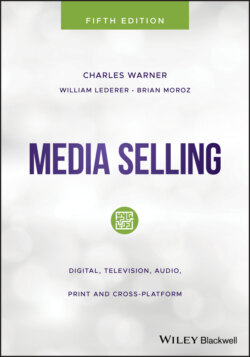Читать книгу Media Selling - Warner Charles Dudley - Страница 168
How important is emotional intelligence in selling?
ОглавлениеGoleman makes the case that, contrary to previously held theories, IQ might not be an accurate predictor of life success. “At best IQ contributes about 20 percent to the factors that determine life success, which leaves 80 percent to other forces. As one observer notes, ‘The vast majority of one’s ultimate niche in society is determined by non‐IQ factors, ranging from social class to luck.’”2 A study of Harvard graduates in the fields of law, medicine, teaching, and business found that scores on entrance exams, a surrogate for IQ, had zero or negative correlation with eventual career success.
A study initiated in 1968 by the Stanford Graduate School of Business reinforced the importance of emotional intelligence for success in business. It conducted in‐depth interviews with the members of its graduating class, which examined the students’ academic records and grades, their extracurricular and social activities, and their reputation among their fellow students. The school kept track of the graduates’ careers and levels of success with re‐interviews in 1978 and in 1988. When the school published the findings of its 20‐year study in 1988, it concluded that the only two things that the most successful graduates (top five percent in title, position, money, for example) had in common was that all of the most successful graduates were in the bottom half of their class in grades and all of them were popular. In other words, relationship skills were more important for success than grades.
A major element of and success is optimism. A study of salesmen at Met Life by Martin Seligman revealed that,
Being able to take a rejection with grace is essential in sales of all kinds, especially with a product like insurance, where the ratio of nos to yeses can be so discouragingly high. For this reason, about three quarters of insurance salesmen quit in their first three years. Seligman found that new salesmen who were by nature optimists sold 37 percent more insurance in their first two years on the job than did pessimists. And during the first year the pessimists quit at twice the rate of the optimists.”3
Media salespeople sell an intangible product similar to what insurance salespeople sell, but media salespeople do not have quite the same rejection rate, which makes media selling more desirable and satisfying. However, the above research reinforces the importance of optimism in selling. Optimism is defined in terms of how people explain to themselves their own successes and failures. People who are optimistic believe failures are the result of something that can be changed so that they can be successful the next time around. Pessimists take personal blame for failures, attributing them to some inherent characteristic they are helpless to change.4 Pessimists also often blame their parents or their bosses or even the weather for their failures. Their attitude is that they expect failure; therefore, they create failures and a disastrous future. On the other hand, optimists expect success, and therefore create a successful future. Seligman’s research reinforces the importance of attitude in selling.
